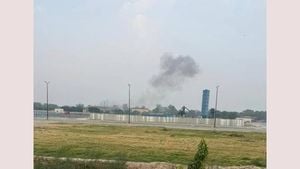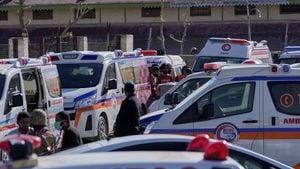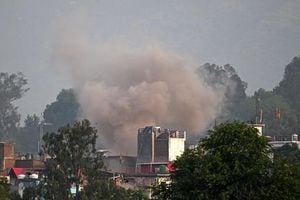On May 6, 2025, a significant political controversy erupted in India following the deadly Pahalgam attack, which claimed the lives of several tourists and civilians. The attack has drawn widespread condemnation, including a statement from Qatar's Amir who expressed full support for India's fight against terrorism. The political climate intensified as Congress President Mallikarjun Kharge made bold claims regarding Prime Minister Narendra Modi's prior knowledge of the attack.
Kharge alleged that PM Modi had received an intelligence report three days before the attack, prompting him to cancel his planned visit to Kashmir. "I have received information that three days before the attack, an intelligence report was sent to Prime Minister Modi, and based on that, he cancelled his program to visit Kashmir. I also read this in a newspaper. If intelligence could warn that it wasn’t safe for you (the PM) to go there, why didn’t you take proper steps to protect the tourists and civilians?" Kharge questioned, raising eyebrows and igniting a fierce backlash from the ruling NDA coalition.
The Pahalgam attack, which has been widely condemned, has put the government under scrutiny. The Amir of Qatar, in a conversation with PM Modi, condemned the violence and reiterated his country's support against terrorism. His remarks highlight the international community's concern over security issues in the region.
In response to Kharge's allegations, BJP leaders were quick to express their outrage. BJP MP Ravi Shankar Prasad criticized Kharge's statements, emphasizing the heightened border tensions faced by the country. "What has happened to Kharge ji…On one hand, during the meeting, they say that they are with the country and on the other hand, they are saying that the PM did not go to Kashmir because he was aware of the attack…This is an unfortunate thing to hear, especially when the country is already going through so much border tension…We do not expect such things at this moment," Prasad stated.
Additionally, BJP leader CR Kesavan demanded an unconditional apology from Kharge for his remarks, labeling them as treacherous. He stated, "He has made treacherous statements similar to a modern-day Mir Jaffar. His toxic, baseless, unfounded rant against the Prime Minister is most deplorable and condemnable, and Kharge’s remarks are unpardonable, indefensible, and cannot be forgiven. Everybody demands an unconditional apology from him, and he should also come clean on what kind of inputs he received to make such outrageous remarks."
The Pahalgam attack and the subsequent political fallout have sparked a broader debate about national security and the government’s preparedness in safeguarding both tourists and civilians in conflict-prone areas. The timing of Kharge's comments has raised concerns about political motivations during a sensitive period for the country.
As the situation continues to unfold, the public remains divided. Some support Kharge’s calls for accountability, while others see the comments as a politically motivated attack during a time of crisis. The BJP's vehement defense of PM Modi underscores the party's commitment to maintaining a united front in the face of adversity.
While the incident has led to political tensions, it also serves as a reminder of the ongoing challenges faced by the Indian government in ensuring safety and security in volatile regions. The international response, particularly from allies like Qatar, may play a crucial role in shaping the narrative surrounding India's fight against terrorism.
As the investigation into the Pahalgam attack continues, the government faces mounting pressure to address security lapses and reassure the public that measures are in place to prevent such tragedies in the future. The political ramifications of this incident will likely influence the upcoming electoral landscape, as parties navigate the delicate balance between national security concerns and political accountability.
In summary, the Pahalgam attack has not only raised pressing questions about security but has also ignited a political firestorm that may have lasting implications for India's leadership and its approach to terrorism. As the nation grapples with these issues, the dialogue surrounding accountability, security, and political responsibility remains more critical than ever.



